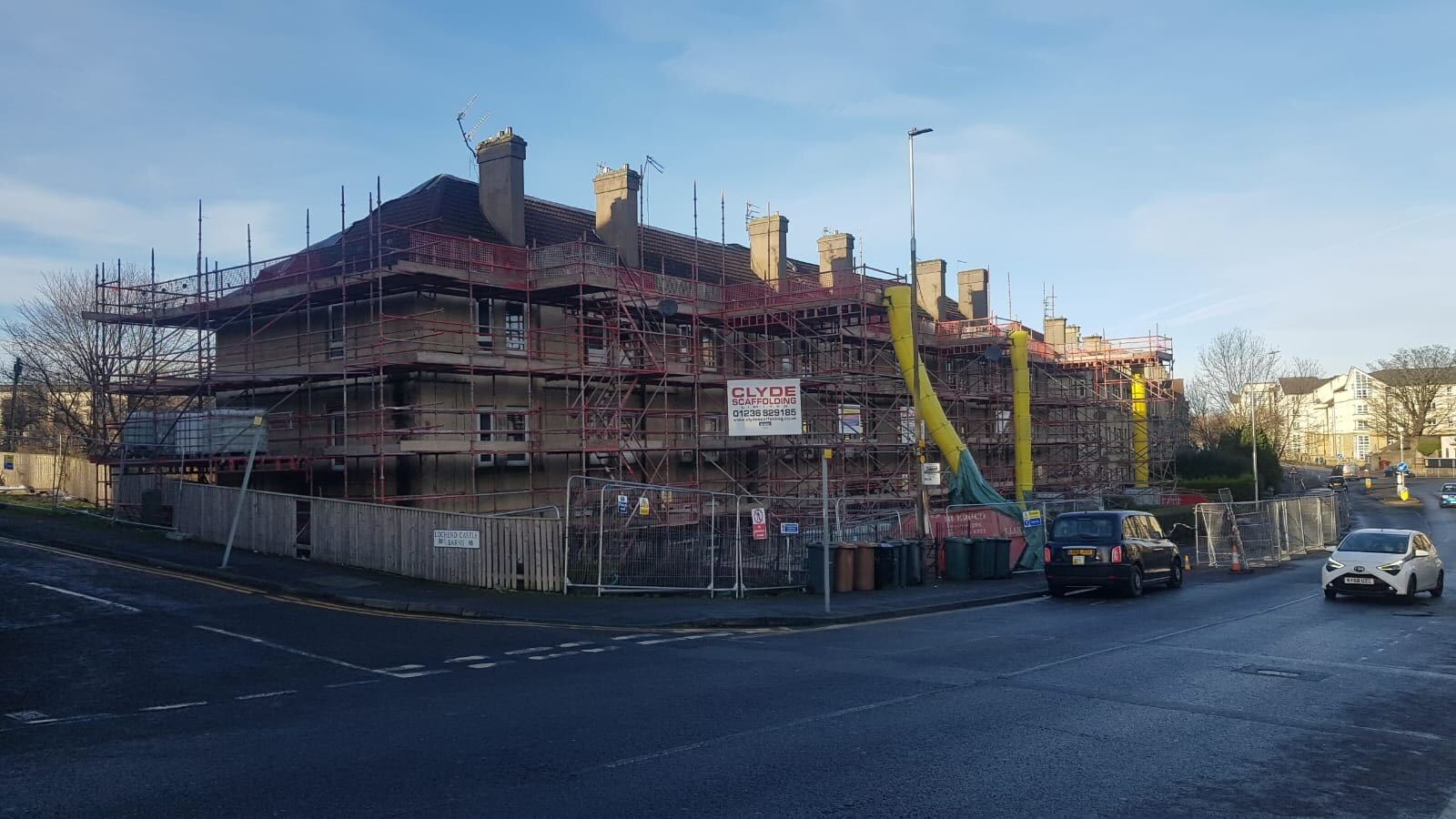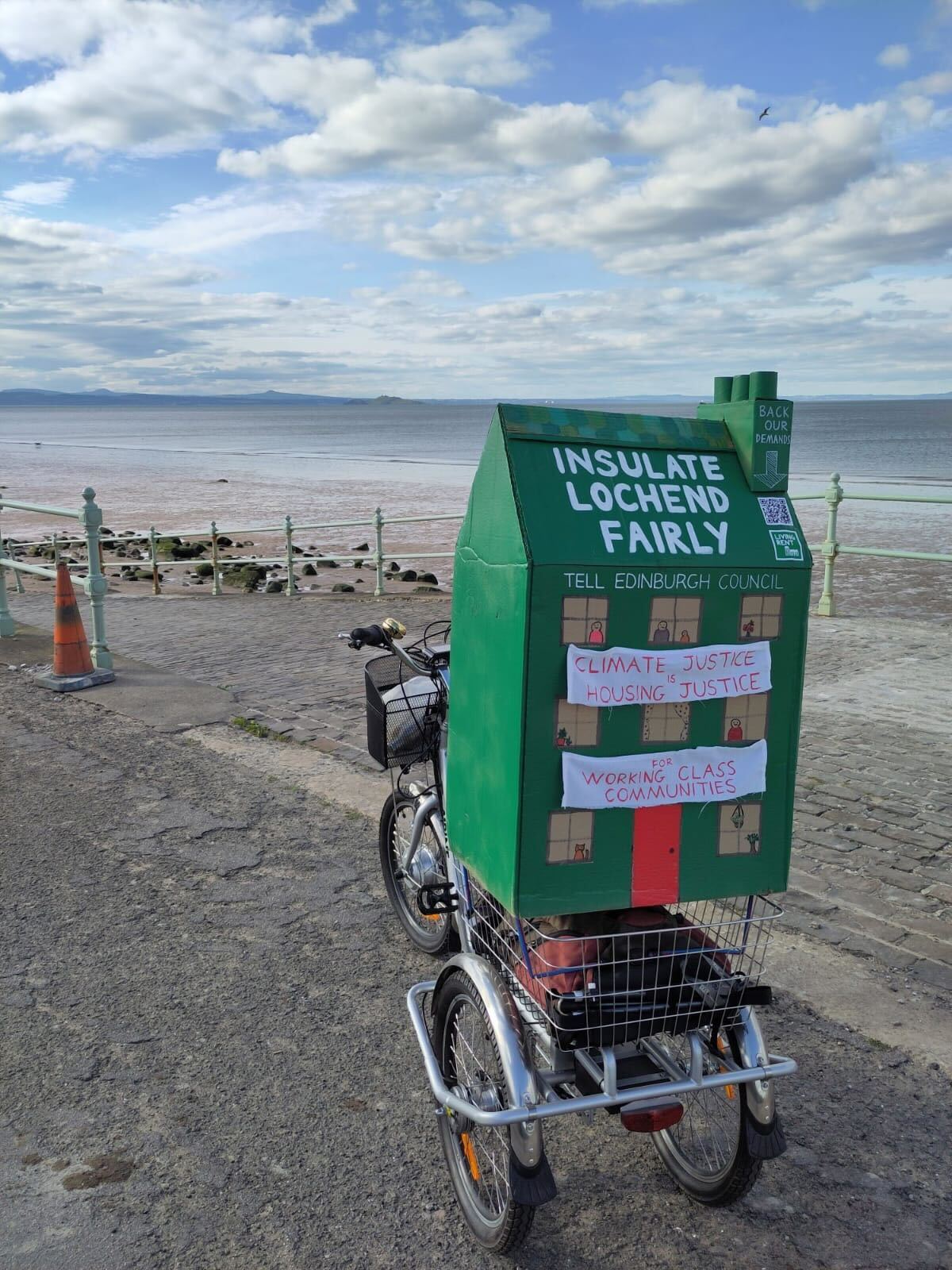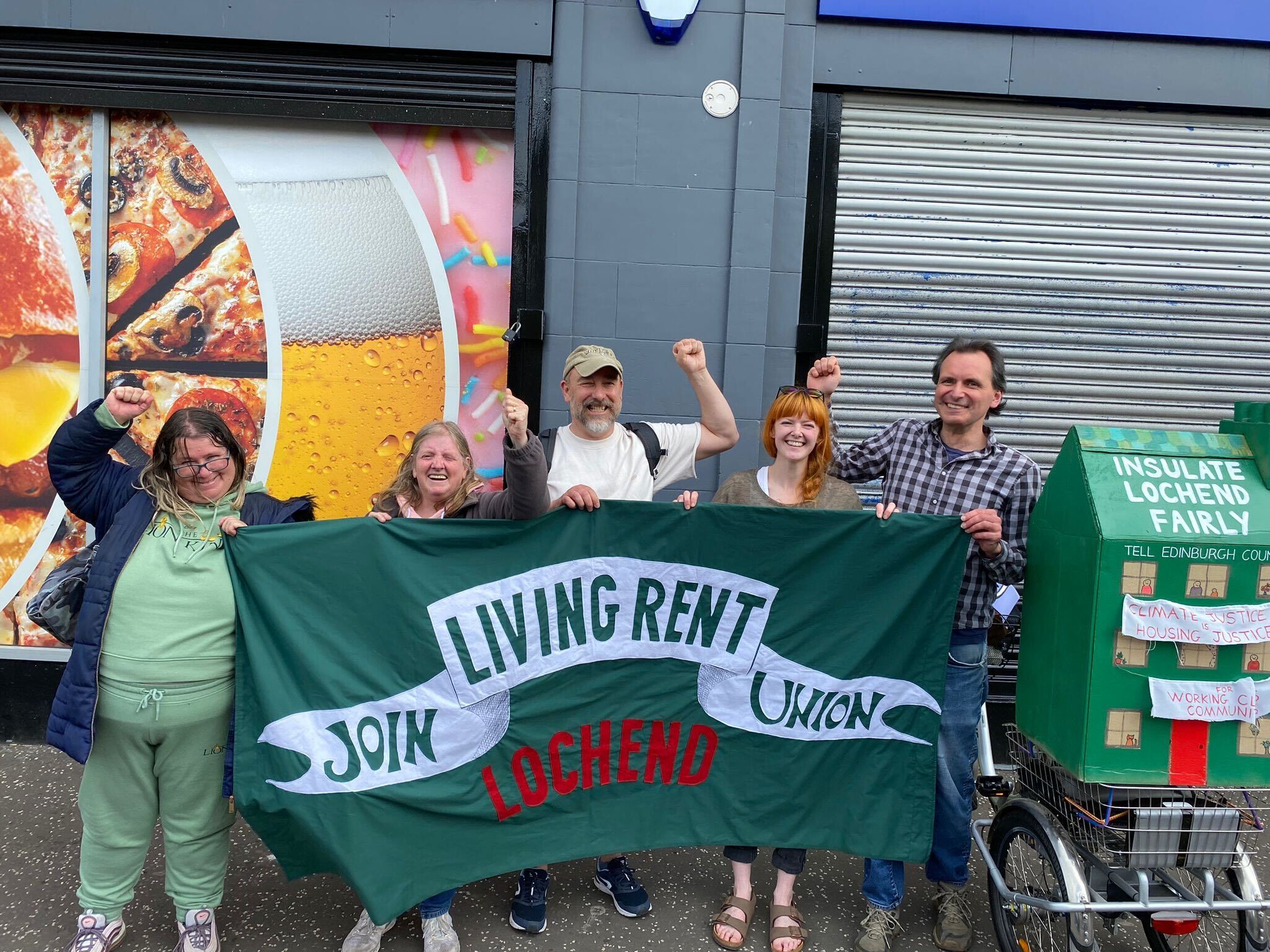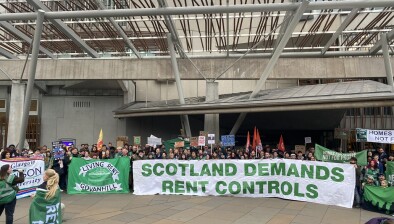Mel Esquerre: A personal account of Edinburgh’s ‘dystopian’ retrofit scheme

Image credit: Living Rent
Mel Esquerre, an Edinburgh resident and retrofit campaigner, shares her experience of the City of Edinburgh Council’s Mixed Tenure Improvement Service (MTIS) scheme and her concerns that people are being harmed as a result.
In the last month alone, five different neighbours have approached me, anxious for information about the retrofit scheme in our community. So, I take my dog and we meet for a chat and a walk around the local park.
Our neighbourhood is Lochend, in north east Edinburgh. Lochend happens to score high in the Scottish Index of Multiple Deprivation. It also contains a high proportion of mixed tenure blocks where council tenants, private owners and private tenants live.
Lochend was in the news a couple of years ago thanks to a campaign by Living Rent to secure much needed investment in the area after years of neglect by the council. But our joy at this win for residents soon became a dystopian reality.

Image credit: Living Rent
Of those five neighbours, two were tenants — now evicted. Three are owner-occupiers like me who will end up in thousands of pounds of additional debt for works to our flats that we didn’t ask for nor have any say over. The initial estimates sent to my neighbours range from £19-33k per flat. I think a little anxiety wouldn’t be surprising to anyone who is suddenly presented with an estimate for works higher than their annual salary. This is the result of MTIS.
MTIS (Mixed Tenure Improvement Service) was introduced by the City of Edinburgh Council to Lochend in 2023. Prior to that it had started in Wester Hailes, in south west Edinburgh. MTIS targets blocks like ours, in high deprivation areas where the council owns a significant proportion of properties.
In my day job, I frequently attend industry conferences - where the same slides show time and time again the iconic purple building in Wester Hailes that MTIS transformed. If we go to the same housing and construction conferences, you will have seen the photo too. What’s more, the MTIS team continues to nominate itself for housing and regeneration awards.
What they are less likely to talk about is the 73 owners who have had no option but to sell their homes as they couldn’t afford the works. Or the 38 families who lost their tenancies as a direct result of MTIS. We don’t hear much about the hundreds of people in the most deprived areas of the city having to get themselves into substantial additional debt to pay for the works, plus the hefty additional management fee being charged by the council. Or those unable to access traditional finance who have had to arrange a payment plan with the council with a high interest rate because being poor is expensive.

Melissa Esquerre
Perhaps you are thinking, of course owners in flats should pay for their share of communal works. I agree. No one I have spoken to is against the works, or against the principle of sharing the costs fairly. What I struggle to understand is whoever conceived that the best way to help a deprived community would be to impose from the top down and without consultation. Worse still, without really understanding the needs of that community, the council is imposing a scheme that is already causing harm.
When one party holds all the power and information, advocating for yourself is exhausting. Some examples of barriers residents face include the long, confusing and often contradictory letters we receive, time and time again incorrect or out of date. The need to always be the ones chasing for information. Being told that we have to hope that the final invoice will, at some point in the future, be lower than the estimate given now, but having to live with that estimated amount hanging over you for, well, no one knows how long. If you are a private tenant, knowing that your landlord will get more money if they sell their flat empty to the council, and just like that, you no longer have a home.
Someone described it to me like having your kitchen replaced, and the contractor telling you it will happen “sometime” and it will cost “something” and all you’re supposed to do is sit tight and wait, with your life on hold with no option to say no.
What continues to take my breath away when I speak with neighbours is the utter misery that people are going through behind the scenes. Just normal, working class neighbours who do not just have the thousands of pounds set aside “in savings” to pay for the works that they didn’t ask for. Yes, the council in its official website tells people to “use their savings”.

Image credit: Living Rent
People for whom traditional financing is not available. People who bought their homes with government help so they don’t own the full property but they will owe the full debt. People who would love to be able to have a conversation with the council about prioritising some works but not others - maybe the roof really needs attention but the redecoration could wait? Too bad, it’s all or nothing if the council is the majority owner in your block.
The contempt and disrespect we are being shown is astonishing. Losing all control over what happens to your home is something I really struggle to explain.
MTIS is proudly mentioned in Edinburgh’s LHEES delivery plan. This same plan mentions other highly deprived areas in the city where the council intends to implement similar schemes.
Eighteen months on from the first letters announcing the scheme was coming to Lochend and an awful lot of residents’ anxiety later, we have nothing. No works have started. We have been given no reasons for the delays. In fact we know that at their latest meeting in October, the Housing, Homelessness and Fair Work Committee paused the scheme from significant further expansion because it is not consistent with a just transition. I wish they had noticed that sooner.
The City of Edinburgh Council’s response
In terms of consultation/engagement, the City of Edinburgh Council said it will:
- contact all residents to introduce ourselves and explain the service
- assign a dedicated case officer for each block
- in blocks where the council owns less than 51% of the flats, conduct a vote to proceed with a building condition survey
- carry out a survey of the building to assess the condition of external walls, roofs, drainage etc and identify level of insulation present. (it will not be surveying inside private homes)
- identifying any work required to bring the building up to an acceptable standard
- send all owners a vote form with a copy of the survey report and a cost estimate for the required repairs and maintenance and ask you to vote for or against the recommended work
- let all residents know the result of the vote - the ‘Scheme Decision’
- assist homeowners in applying for any government funding they are eligible for
- represent all council-owned flats during the project.
Housing, Homelessness and Fair Work convener Jane Meagher told Scottish Housing News: “Bringing all our housing stock up to a good condition, making homes energy efficient, warm and affordable to heat is very important, both for tenants and for owners in these blocks.
“The reality is that doing nothing is not an option. Homes which are not repaired and maintained will be at risk of further deterioration and will cost more to fix in the future.
“By making these older homes more energy efficient, we’re driving down carbon emissions and clamping down on issues like damp and fuel poverty.
“Not only will owners and tenants use less energy, and therefore save money on energy bills, but they’ll notice a huge improvement in the overall area because of the works.
“We engage with owners and tenants from the earliest opportunity to discuss options and costs with owners and continue to offer support throughout the scheme.”







